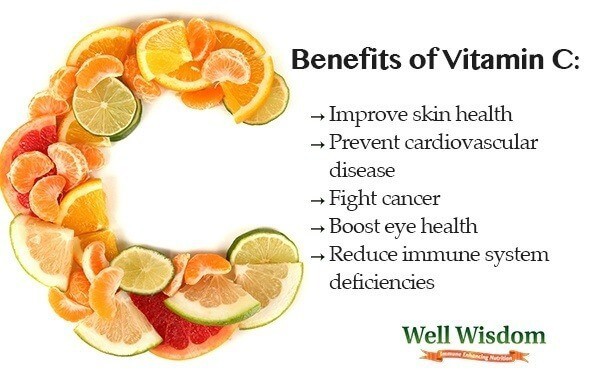
We’ve all heard that Vitamin C is one of the best things to take when you have a cold or virus, as the vitamin should help your immune system fight the infection. But is that actually the case, or just a commonly believed myth?
In this post, we’ll find out the truth of whether or not Vitamin C helps the immune system function and also the connection between whey, glutathione, vitamin C and immunity.
Does Vitamin C Boost Your Immune System?
Does Vitamin C help your immune system? The theory that Vitamin C could fight disease and infection began way back in the 1970s, when Linus Pauling, a Nobel prize winner, published information on preventing colds by taking huge doses of Vitamin C. While the Recommended Dietary Allowance (RDA) for vitamin C is 90 mg of Vitamin C per day for men and 75 mg per day for women, Pauling would consume up to 18,000 mg of Vitamin C a day.
Since then, a lot of research has gone into whether or not Vitamin C could help to deal with colds and the flu, and the truth is that very little evidence has been discovered that proves Pauling’s theory. There have been a number of randomized, double-blind, placebo-controlled studies into the effects of Vitamin C, and the results seemed to be quite a disappointment.
A 2013 review of 29 different studies with over 11,300 participants evaluated all the data around vitamin C and the common cold. The results found that taking more than 200 mg of Vitamin C per day as a therapy once you have a cold did little to reduce the severity or duration of colds and the flu. But, taking vitamin C regularly did seem to impact the duration and severity of the cold. The conclusion was that more research on vitamin C and the common cold is needed to determine the exact best way to use it.
Note: Taking Vitamin C helped to reduce the severity and duration of the colds, but not the FREQUENCY. It can help to treat the cold, but not prevent it.
So, taking Vitamin C won’t prevent colds, but it can help to make them less severe and will help you heal more quickly.
Vitamin C, Glutathione and Whey Protein
Glutathione is the body’s most important antioxidant. Depletion of glutathione levels through stress and aging has been found to increase the risk of chronic diseases and exacerbate poor immune function. In order to support optimal immunity, the body needs adequate glutathione. This can be accomplished by increasing vitamin C and whey protein in the diet.
Vitamin C is critical for helping the body maintain glutathione levels, protecting the body from illness. Taking vitamin C supplements has been found to increase levels of glutathione in the blood. One study found that 500 mg of vitamin C supplements increased glutathione by 47% in red blood cells.
Vitamin C is also an antioxidant. It is believed that neutralizes free radicals before glutathione, protecting levels of the body’s most important antioxidants. Vitamin C may also help regenerate glutathione, by helping it return to its active form once it has fought off a free radical.
What does this have to do with whey? Whey protein contains the amino acids cysteine and glutamine, precursors to glutathione. Glutathione supplements have not been found to be particularly efficient, so instead taking whey in combination with vitamin C may be the best way to increase glutathione and support immune health.
HOW MUCH Vitamin C PER DAY?
According to a recent analysis published in Seminars in Preventive and Alternative Medicine, we may not be getting enough Vitamin C in our daily diets. This analysis looked at over 100 studies on Vitamin C, and found that higher doses are actually better for our health.
Just because the RDA is 75 to 90 mg per person per day, that may not be enough. The RDA is designed to prevent any vitamin deficiencies from happening. It is not the ideal number for most vitamins and minerals.
The best way to get your vitamin C is from food. Fruits and vegetables are an incredible source of vitamin C and are loaded with many other nutrients critical for health. The goal is to consume at least 5 servings of fruits and veggies. That’s the only way to be certain that you’re getting enough vitamin C! Foods highest in vitamin C include: strawberries, citrus and bell peppers, but most fruits and vegetables are a good source.

THE OTHER BENEFITS OF VITAMIN C
Vitamin C offers a lot of other health benefits, in addition to helping boost glutathione and protect immune function.
Health benefits of vitamin C:
- Improve skin health. Vitamin C is needed for the production of collagen, which keeps your skin healthy.
- Prevent cardiovascular disease. By reducing cholesterol, preventing plaque buildup, and improving circulation, Vitamin C can reduce cardiac disorders.
- Helps avoid cancer. As an antioxidant, Vitamin C can help to neutralize free radicals and toxins in the body, which could lead to the development of cancer.
- Boost eye health. Vitamin C protects the cells of your eyes, reducing the macular degeneration (cell decay) rate.
- Reduce immune system deficiencies. A lack of Vitamin C can lead to a serious immune deficiency called scurvy.
Taking Vitamin C can boost your overall health, and it will definitely help to heal your cold when it sets in. Just because it doesn’t prevent you from ever getting a cold doesn’t mean it’s not supremely important! To support optimal immunity and health, a combination of whey protein and vitamin C may be just what the doctor ordered.
- Persistent Tiredness and Chronic Fatigue: Causes and Symptoms - February 27, 2024
- Can A Protein Shake Replace A Breakfast Meal? - March 2, 2023
- Glutamine After Surgery: Does It Help With Recovery? - February 17, 2023






My uncle,(who was a Doctor) told me you can take up to 1200 units of vitamin C without damaging the kidneys. For serious infections 1500 units may be taken but for no more than a day. This should also be taken wit increased water intake to help “flush” the kidneys.
I love the information you gathered and posted here. I enjoyed reading this valuable article